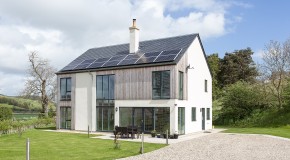The way we communicate and work has changed dramatically thanks to technology, and the idea of a home is also being redefined. The smart home revolution has gained traction in recent years thanks to an increase in cutting-edge appliances and systems created to boost efficiency, security, and comfort.
The smart home industry has evolved significantly since it started as a specialised market catering to technology enthusiasts. Interconnected devices and systems are gaining popularity among homeowners and property developers as they realise the benefits of incorporating them into their living spaces. According to industry experts, the smart home market is poised to exceed $150 billion by 2025, underscoring the growing desire for sophisticated technologies that can adapt to the evolving requirements of contemporary homes.
Home automation systems have emerged as the central hubs of intelligent homes. Homeowners can now manage different aspects of their property with ease, thanks to centralised control systems like Amazon's Alexa, Google Assistant, or Apple's HomeKit. These systems allow users to control their homes through voice commands, smartphone apps, and even gesture controls. Automation systems offer a personalised living experience by seamlessly controlling lighting, temperature, security, and entertainment systems.
Smart homes prioritise energy management as a crucial aspect. Smart thermostats such as Nest, Ecobee, and Honeywell are revolutionising the way home owners manage their property's temperature, enabling them to do so with greater efficiency. Smart devices are capable of optimising heating and cooling systems to reduce energy consumption and greenhouse gas emissions. By learning the preferences and schedules of the occupants, these devices can effectively minimise utility bills.
Homeowners can now customise the colour, intensity, and timing of their lights with the help of smart lighting solutions like Philips Hue, LIFX, or Ikea's TRÅDFRI. The customizable settings offered by this product not only allow users to create the perfect ambiance, but also promote energy conservation through the use of LED bulbs, motion sensors, and automatic shut-off features.
The world of security and surveillance has undergone a significant transformation with the advent of smart security systems. Among these systems are doorbells that come equipped with cameras, such as Ring or Nest Hello. Homeowners can now enjoy enhanced protection and peace of mind with the use of these devices. They are designed to send alerts when unusual activity is detected and offer remote access to live feeds, ensuring that properties remain secure at all times. Incorporating smart locks, window sensors, and flood sensors into advanced security systems can provide a comprehensive security solution.
A new generation of connected appliances is redefining the way people approach household tasks. Samsung's Family Hub and other smart refrigerators have revolutionised the way we manage our food inventory. These high-tech appliances are equipped with features that allow them to track expiration dates, suggest recipes, and display family calendars, making them an indispensable tool for modern households. The ThinQ series of washing machines and dryers from LG have been designed to enhance efficiency and convenience by optimising detergent use, water consumption, and drying times.
Smart homes have the potential to contribute to the welfare of their residents. Home health monitoring devices, such as Awair or Dyson's Pure Cool, have the ability to monitor and enhance indoor air quality through the use of air quality sensors and purifiers. Sleep Number's 360 Smart Bed and other sleep tracking devices have the ability to analyse and optimise sleep patterns, leading to a more restful night for users.
The integration of smart home technology into contemporary residences offers an abundance of advantages that go beyond the scope of the individual homeowner. Smart home systems offer a high degree of customization and effectiveness, empowering inhabitants to customise their living quarters to their individual requirements and inclinations. These energy-efficient homes are designed to encourage conservation and assist homeowners in reducing their utility expenses. Homeowners can now enjoy peace of mind with the latest advanced security systems that offer improved protection against intruders. These systems also provide real-time updates on the security status of the property.
Smart devices have the ability to identify potential issues, such as water leaks or appliance malfunctions, before they become expensive problems. Taking a proactive approach to home maintenance can potentially save homeowners both time and money, according to experts. Smart homes are proving advantageous for people with disabilities or mobility issues. They provide enhanced accessibility features such as voice-activated controls and automated door openers, making life easier for those who need it the most.
According to industry experts, properties that come equipped with smart home technology are increasingly attractive to potential buyers or renters. This trend has been observed to result in higher property values and faster sales or rental transactions. With the advent of modern technology, homeowners are now able to remotely manage their properties, thereby enabling them to maintain control even when they are not physically present at home. This feature proves to be of great utility for people who travel frequently or possess multiple properties.
With the rapid evolution of technology, it is anticipated that our living spaces will witness the integration of even more groundbreaking solutions. As the smart home industry continues to evolve, experts predict that artificial intelligence and machine learning will be key players in its development. These technologies are expected to enhance the adaptability, intuition, and efficiency of smart home systems, making them even more advanced and effective.
Staying up-to-date with the latest smart home trends and comprehending their impact on the property market is of utmost importance for property developers and estate agents. As the technology behind smart homes continues to advance, it is expected to become a crucial factor in the real estate market. Homebuyers and renters are now seeking properties that can provide them with the utmost comfort, convenience, and security, making smart home technology a highly sought-after feature in modern homes.
The integration of technology in modern properties and the rise of smart homes are fundamentally transforming the way we live. With the increasing adoption of these innovations by homeowners and developers, our living spaces are set to become more efficient, connected, and sustainable. This will ultimately lead to a greener, more comfortable, and technologically advanced world. As the smart home technology landscape continues to evolve, estate agents and property professionals must be ready to adapt in order to effectively guide their clients through these changes.




